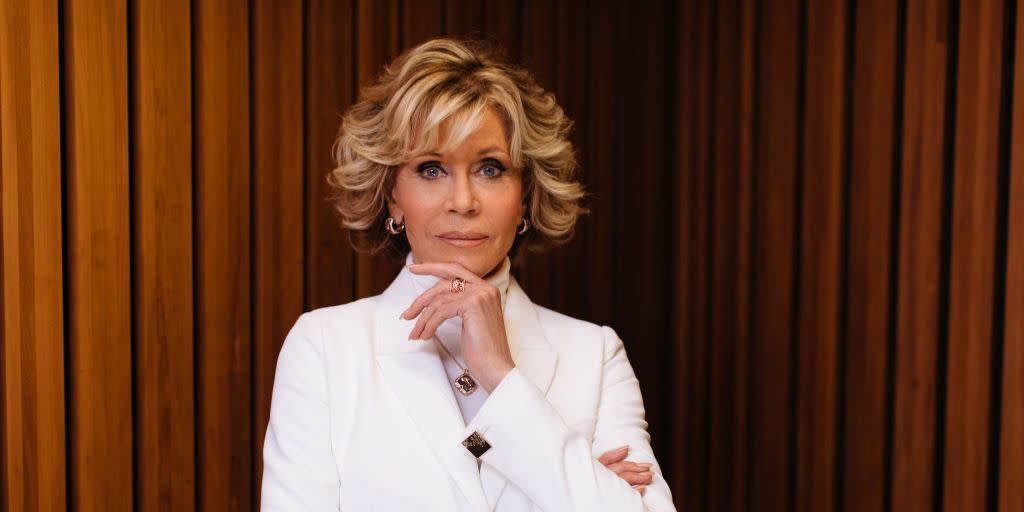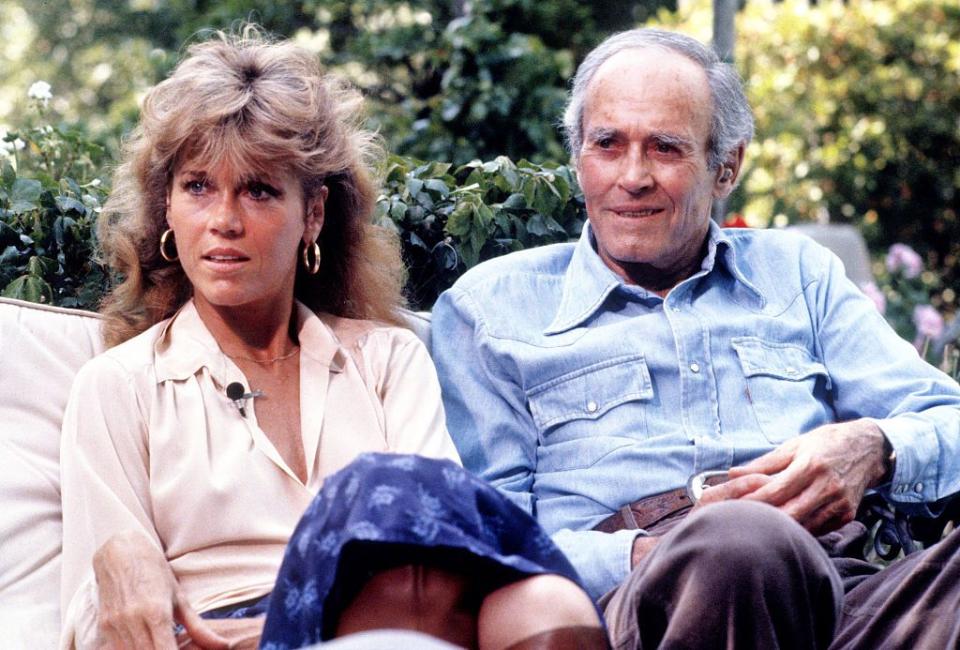Jane Fonda has shared her biggest life lessons

When Jane Fonda flashes up on my screen for our Zoom interview, wearing a chic blue sweater elegantly draped with a leopard-print scarf, she asks abruptly, ‘Have you read my book?’ The book she’s referring to is her first on the subject of activism, What Can I Do?: The Truth About Climate Change And How To Fix It. It’s a rallying call to halt the climate emergency, combining scientific knowledge with her personal experience, as well as practical tools to equip anyone who wants to help make a difference.
Truth be told, it’s not the kind of book you’d expect from Hollywood royalty, but then again, Fonda has consistently broken the mould of what a film star can – and should – do. Her long and illustrious career, which began with big-screen roles in 1960s cult classics Barefoot in the Park and Barbarella, has seen her become a seven-time Oscar nominee (and two-time winner), reinvent herself as a fitness guru with an exercise video that became the bestselling VHS tape (remember those?) of all time - and more recently, win over hoards of news fans in her role as tightly-wound divorcee Grace Hanson in Netflix’s longest-running original TV show, Grace and Frankie.
In the midst of it all of course, Fonda has made a name for herself as a gutsy activist, too. She stood in solidarity with the 1960s Civil Rights Movement, has protested against wars from Vietnam to Iraq, and is an effervescent champion of women’s rights. And now, aged 82, she's turned her attention to the climate crisis, which she describes as ‘the most challenging thing to ever confront humankind.' Influenced by Greta Thunberg, she initiated ‘Fire Drill Fridays’ last October, leading weekly demonstrations on Capitol Hill to encourage the White House to address the climate emergency, which led to her arrest for three consecutive weeks. Fonda remained undeterred.
At the time of our interview, I admit that I'm halfway through her book (I'm relieved she seems okay with this), yet already I feel galvanised to pick up a placard of my own. And as we speak, I realise that this is the Fonda effect. She has a fighting spirit, which is impossible not to absorb. It has no doubt seen her through the more difficult times in her life; a troubled relationship with her actor father, Henry Fonda, exacerbated by her mother's suicide when Fonda was just 12. Her complicated upbringing, she has said, affected her own marriages; to director Roger Vadim, activist Tom Hayden, and businessman Ted Turner, all of which ended in divorce. It also impacted the way she mothered her now grown-up children, Vanessa, Troy and Mary.

And it's this fighting spirit that I can't help but feel we could all do with a bit more of right now. As I talk to her, Fonda reveals some of the lessons she's learned about standing tall, speaking out and following your own path.
IT'S MORE IMPORTANT TO BE INTERESTED THAN INTERESTING
'So often, famous people want to be interesting. But if you stay interested, that makes you interesting – and you’ll also be young at heart. I left acting for 15 years and made a comeback at the age of 63, which is unheard of. It was a film called Monster-In-Law, with Jennifer Lopez. I think the fact I stayed curious, and still so keen to learn, kept my talent alive, so I could step back into acting and seem like I had never missed a beat.'
FINDING YOUR VOICE TAKES PRACTICE
'Some people find their voice at a young age, and a lot of that has to do with how your parents treated you – whether they really saw you and encouraged you. A lot of us didn’t have that, so we have to work on ourselves. I didn’t start finding my voice until my seventies, to tell you the truth. You need to be intentional about it, which means studying, reading and talking to interesting people. It also means using your voice, even if you don’t feel confident. The climate emergency is the one thing in my mind that matters above all else, and it will overwhelm us like a great tsunami if we don't understand the urgency of it. If I can speak about it at rallies now with a little authority, that’s only because I’ve been doing it for a long time and, I might add, doing it terribly. You can’t get good at something unless you’re willing to do it terribly.’
OWN UP TO YOUR FAILURES
'All three of my marriages were failures, and I’ve spent a great deal of time trying to understand my role in why they failed. It’s always a two-way street. If you go through life blaming other people, thinking the world is full of assholes and you’re the only one who’s right, you get stuck. We have to make sure we are capable of owning our mistakes, understanding our weaknesses and working to change and overcome them. We have to take responsibility for our lives.’
BE PRESENT WITH YOUR KIDS
'One of my biggest regrets is that I didn't show up for my kids. I did what my parents did with me. I provided for them, ensured they had nice clothes, they were always fed, and took them to their doctors’ appointments. But when I walked through the door at the end of a work day, I didn’t get on the floor and play with them. I didn’t look into their eyes and reflect themselves back to themselves with love. I didn’t know how to do that. But I’m good with my grandkids. It’s my second chance.’
RELATIONSHIPS REQUIRE TRUE INTIMACY
'I’m not talking about sex, but the ability to really, truly show up for the other person, fully and wholly. The good parts, the bad parts, and to ask your partner to do the same. And I don’t think I ever did that, which is why I ended up choosing people who would never demand that of me, because they couldn’t do it themselves.'
EMBRACE YOUR OWN PATH
‘I’m enjoying being single now. My father was married five times – I don’t think I’m meant to be in a long-term relationship. That said, I don’t regret having tried to be in long-term relationships, because every relationship helped me understand myself better. For example, I learned that I’m not a caretaker and I’m not good at caregiving. I’m not going to be in a sexual relationship again – I’ve closed up shop!’
DON'T TAKE YOUR BODY FOR GRANTED
'Staying healthy and fit is so important, and even more so as you get older. A young body is filled with forgiveness. When you get old, if you turn into a couch potato, you’re asking for trouble. So the most important thing when you’re older is to keep moving, walking, keeping up your flexibility, keeping up your strength. I work out still. I do it slowly and carefully, and I do it for me. And as long as I’m feeling healthy, I feel good about myself.’
WORK AT YOUR FRIENDSHIPS
'It’s such a cliché, but your friendships are like gardens, you really have to tend them. You have to pay attention. My friends are smarter, braver and more strategic than me, so I learn from them. I'm also the oldest of all my friends, which is good because as I get closer to death, I’ll still have friends alive!’
DON'T FEAR GETTING OLDER - LIFE ACTUALLY GETS EASIER
'I might have had two knee replacements, hip replacements, and I've had my thumb replaced, but thankfully my brain and my heart, my main organs, are all fine. Assuming good health, life actually gets easier after 50. There’s less hostility, less anxiety, more of a sense of wellbeing. Who knew? Most people have no idea of that. You have this long expanse behind you; you know what to avoid. You’ve been through grief and financial upheaval and you’ve survived. Been there, done that. When you’re young, it’s so hard. It’s all: what am I supposed to do? Who am I? These fundamental existential questions absorb you, and not enough young people realise that it’s actually difficult to be young. It gets easier when you get older. My eyesight is worse, but I have more insight.’
Subscribe to Red now to get the magazine delivered to your door.
Like this article? Sign up to our newsletter to get more articles like this delivered straight to your inbox.
You Might Also Like



